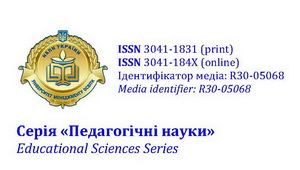Characteristics of the development of creative thinking in early childhood
Анотація
Ключові слова
Повний текст:
PDF (English)Посилання
REFERENCES / СПИСОК ВИКОРИСТАНИХ ДЖЕРЕЛ
R. İ. Əliyev, Humanist psixologiya. Bakı, Azərbaycan : ADPU-nun nəşriyyatı, 2023.
M. S. Əliyev, Psixologiyanın əsasları. Bakı, Azərbaycan : ADPU-nun nəşriyyatı, 2017.
Ə. Ə. Əlizadə, İdrak prosesləri və hisslər. Psiхopedaqoji məsələlər. Bakı, Azərbaycan : ADPU-nun nəşriyyatı, 2010.
Təhsil Haqqında Qanun. Bakı, Azərbaycan : Hüquq ədəbiyyatı nəşriyyatı, 2010.
N. M. Kazımov, Azərbaycan dilinin izahlı pedaqoji lüğəti. Bakı, Azərbaycan : OKA Ofset, 2011.
J. Piaget, Psychology of Intelligence. Moscow, Russia : International Pedagogical Academy, 2004. (російською).
Ə. Ə. Qədirov, Yaş psiхologiyası. Bakı, Azərbaycan : Мaarif, 2002.
F. M. Allahverdiyeva, Pedaqogika. Bakı, Azərbaycan : Elm və təhsil, 2018.
Ə. Ə. Ağayev, Təlim prosesi: ənənə və müasirlik. Bakı, Azərbaycan : Adiloğlu, 2006.
O. M. Dyachenko, Development of the imagination of a preschooler. Moscow, Russia : Psychological Institute of the Russian Academy of Education, 2006. (російською).
L. S. Vygotsky, Thinking and Speech. Moscow, Russia : Pedagogy, 1982, v. 2. (російською).
P. Ya. Galperin, V. L. Danilova, “Development of systematic thinking in the process of solving small creative problems”, Voprosy psihologii, No. 1, pp. 31–38, 1980. (російською).
TRANSLATED AND TRANSLITERATED / ПЕРЕКЛАД, ТРАНСЛІТЕРАЦІЯ
R. I. Aliyev, Humanistic Psychology. Baku, Azerbaijan: Publishing House of ASPU, 2023. (in Azerbaijani).
M. S. Aliyev, Fundamentals of Psychology. Baku, Azerbaijan : Publishing House of ASPU, 2017. (in Azerbaijani).
A. E. Alizade, Cognitive Processes and Feelings. Psychopedagogical Issues. Baku, Azerbaijan : Publishing House of ASPU, 2010. (in Azerbaijani).
Law on Education. Baku, Azerbaijan : Publishing House of Legal Literature, 2010. (in Azerbaijani).
N. M. Kazymov, Explanatory Pedagogical Dictionary of the Azerbaijani Language. Baku, Azerbaijan: OKA Offset, 2011. (in Azerbaijani).
Zh. Piazhe, Psihologiya intellekta. Moskva, Rossiya : Mezhdunar. ped. akademiya, 2004. (in Russian).
A. E. Gadirov, Age Psychology. Baku, Azerbaijan : Maarif, 2002. (in Azerbaijani).
F. M. Allahverdiyeva, Pedagogy. Textbook. Baku, Azerbaijan : Science and Education, 2018. (in Azerbaijani).
A. E. Agayev, Educational Process: Traditions and Modernity. Baku, Azerbaijan : Adiloglu, 2006. (in Azerbaijani).
O. M. Dyachenko, Razvitie voobrazheniya doshkolnika. Moskva, Rossiya : Psihologicheskiy in-t RAO, 2006. (in Russian).
L. S. Vyigotskiy, Myishlenie i rech. Moskva, Rossiya : Pedagogika, 1982, t. 2. (in Russian).
P. Ya. Galperin, V. L. Danilova, «Vospitanie sistematicheskogo myishleniya v protsesse resheniya malyih tvorcheskih zadach», Voprosyi psihologii, v. 1, s. 31–38, 1980. (in Russian).
Посилання
- Поки немає зовнішніх посилань.
